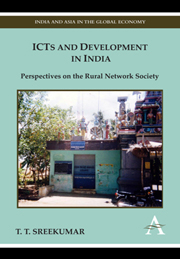Book contents
- Frontmatter
- Contents
- List of Figures and Tables
- Preface
- 1 Introduction: Exploring the Rural Network Society
- 2 Civil Society and Cyber–Libertarian Developmentalism
- 3 Decrypting E-Governance
- 4 Cyber-Kiosks and Dilemmas of Social Inclusion
- 5 Innovating for the Rural Network Society
- 6 ICT and Development: Critical Issues
- Notes
- Bibliography
- Index
4 - Cyber-Kiosks and Dilemmas of Social Inclusion
Published online by Cambridge University Press: 05 March 2012
- Frontmatter
- Contents
- List of Figures and Tables
- Preface
- 1 Introduction: Exploring the Rural Network Society
- 2 Civil Society and Cyber–Libertarian Developmentalism
- 3 Decrypting E-Governance
- 4 Cyber-Kiosks and Dilemmas of Social Inclusion
- 5 Innovating for the Rural Network Society
- 6 ICT and Development: Critical Issues
- Notes
- Bibliography
- Index
Summary
ICTs and Social Change
The idea that ICTs are a unique technological intervention capable of challenging traditional barriers for social change and economic development continues to be the central pillar of ICT-based civil society initiatives in rural South Asia. Contrary to this widely held belief, the actual experience of many acclaimed developmental ICT projects provides grounds for reassessing the strategies and options of ICT deployment in rural spaces, given the fact that the application of information technology has not in itself led to any profound transformation of the social and economic milieu of marginalized communities. While major ICT-based projects, initiated by either the state or CSOs, are floundering due to the existence of formidable social and economic obstacles that they are unable to overcome, several new ICT-based projects are proliferating in rural South Asia. The attempt to usher in economic changes through providing access to net-based services and information has not had a significant impact on the rural economy in India. Besides, the potential for the organizational as well as technical innovations that lay at the base of these interventions, remoulding microlevel practices for generating sustained growth in incomes and jobs, appears to be rather limited and conditioned by the historically given the socioeconomic milieu in which they operate.
In India, one of the major claims made on behalf of these projects, besides their ability to redefine the economic contours of Indian villages, is their potential in engaging in social transformative action at the village level (Dugger 2000; Arunachalam 2002; Rajora 2002).
- Type
- Chapter
- Information
- ICTs and Development in IndiaPerspectives on the Rural Network Society, pp. 97 - 124Publisher: Anthem PressPrint publication year: 2011



